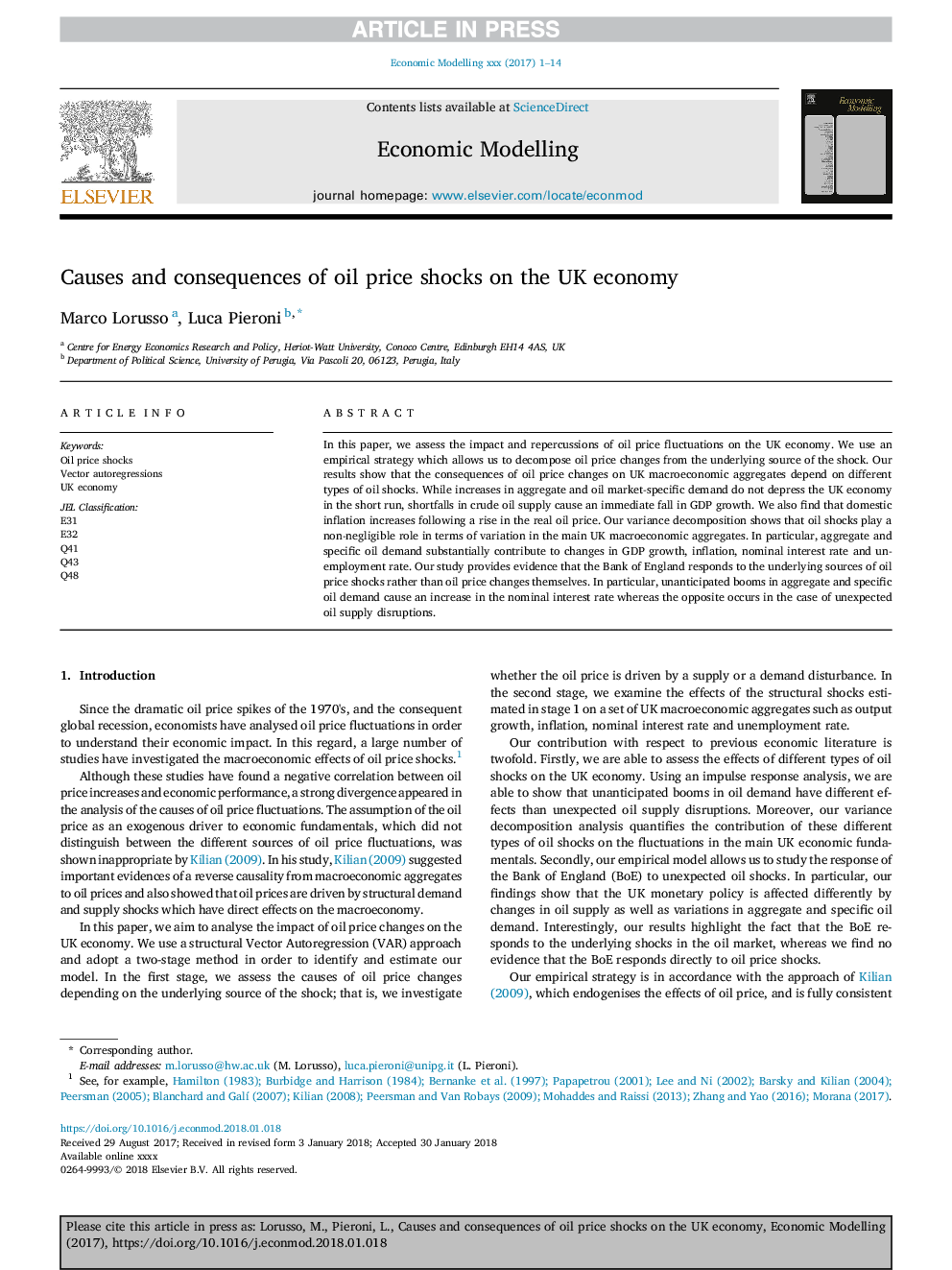| کد مقاله | کد نشریه | سال انتشار | مقاله انگلیسی | نسخه تمام متن |
|---|---|---|---|---|
| 7346996 | 1476497 | 2018 | 14 صفحه PDF | دانلود رایگان |
عنوان انگلیسی مقاله ISI
Causes and consequences of oil price shocks on the UK economy
ترجمه فارسی عنوان
علل و پیامدهای شوک قیمت نفت بر اقتصاد انگلستان
دانلود مقاله + سفارش ترجمه
دانلود مقاله ISI انگلیسی
رایگان برای ایرانیان
کلمات کلیدی
ترجمه چکیده
در این مقاله، تاثیر و پیامدهای نوسانات قیمت نفت بر اقتصاد انگلستان را ارزیابی می کنیم. ما از یک استراتژی تجربی استفاده می کنیم که به ما اجازه می دهد که تغییرات قیمت نفت را از منبع اصلی شوک تجزیه کنیم. نتایج ما نشان می دهد که پیامدهای تغییرات قیمت نفت در شاخص های کلان اقتصادی انگلیس به انواع شوک های نفت بستگی دارد. در حالی که افزایش تقاضای خاص در بازار نفت و گاز در کل، اقتصاد کوتاه مدت در انگلیس را کاهش نمی دهد، کمبود عرضه نفت خام ناشی از کاهش فوری رشد تولید ناخالص داخلی است. ما همچنین می بینیم که افزایش تورم داخلی به دنبال افزایش قیمت واقعی نفت است. تجزیه واریانس ما نشان می دهد که شوک های نفت نقش غیر قابل ملاحظه ای را به لحاظ تغییرات عمده در کل اقتصاد کلان انگلیس ایفا می کنند. به طور خاص، تقاضای کل و ویژه نفت به طور چشمگیری به تغییرات رشد تولید ناخالص داخلی، تورم، نرخ بهره اسمی و نرخ بیکاری کمک می کند. مطالعه ما شواهدی را ارائه می دهد که بانک انگلستان به منابع اصلی قیمت شوک قیمت نفت به جای تغییرات قیمت نفت خود پاسخ می دهد. به طور خاص، رونق غیرمنتظره در تقاضای کل و تقاضای نفت موجب افزایش نرخ بهره اسمی می شود، در حالی که در صورت وقوع اختلالات غیرمنتظره عرضه نفت، برعکس می شود.
موضوعات مرتبط
علوم انسانی و اجتماعی
اقتصاد، اقتصادسنجی و امور مالی
اقتصاد و اقتصادسنجی
چکیده انگلیسی
In this paper, we assess the impact and repercussions of oil price fluctuations on the UK economy. We use an empirical strategy which allows us to decompose oil price changes from the underlying source of the shock. Our results show that the consequences of oil price changes on UK macroeconomic aggregates depend on different types of oil shocks. While increases in aggregate and oil market-specific demand do not depress the UK economy in the short run, shortfalls in crude oil supply cause an immediate fall in GDP growth. We also find that domestic inflation increases following a rise in the real oil price. Our variance decomposition shows that oil shocks play a non-negligible role in terms of variation in the main UK macroeconomic aggregates. In particular, aggregate and specific oil demand substantially contribute to changes in GDP growth, inflation, nominal interest rate and unemployment rate. Our study provides evidence that the Bank of England responds to the underlying sources of oil price shocks rather than oil price changes themselves. In particular, unanticipated booms in aggregate and specific oil demand cause an increase in the nominal interest rate whereas the opposite occurs in the case of unexpected oil supply disruptions.
ناشر
Database: Elsevier - ScienceDirect (ساینس دایرکت)
Journal: Economic Modelling - Volume 72, June 2018, Pages 223-236
Journal: Economic Modelling - Volume 72, June 2018, Pages 223-236
نویسندگان
Marco Lorusso, Luca Pieroni,
